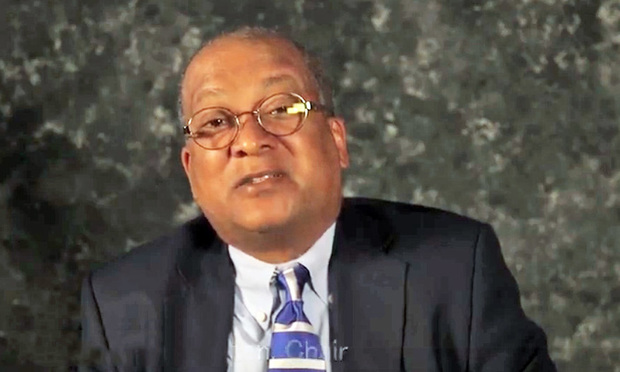'Failure to Take Responsibility': Special Masters' Report Assails Appellate Judge Jeffrey Johnson
The findings will be forwarded to the 11 members of the Commission on Judicial Performance, who will decide what punishment, if any, should be handed out. A lawyer for Johnson said the judge disagrees with many of the findings and "we will be filing a brief providing additional insight to these remaining findings which we believe will be very useful to the commission."
January 03, 2020 at 07:21 PM
5 minute read
 Justice Jeffrey Johnson
Justice Jeffrey Johnson
Attorneys for the Commission on Judicial Performance met "the high burden" of proving most of the 10 counts of misconduct—including groping and sexual harassing co-workers—leveled against Los Angeles appellate court Justice Jeffrey Johnson, a panel of special masters concluded in a report filed Friday.
The 316-page report said the proven allegations, detailed by more than 100 witnesses over 17 days of testimony last year, revealed "ethical lapses" by the justice "that undermine the public's trust in the judicial process and erodes the confidence we ask the public to place in our individual judges."
"These lapses are compounded by Justice Johnson's failure to take responsibility for many of his actions and to manifest insight into his behavior," according to the report, submitted by Justice Judith Haller of the Fourth District Court of Appeal, San Diego County Superior Court Judge Louis Hanoian and Imperial County Superior Court Judge William Lehman.
"We find particularly concerning Justice Johnson's actions towards women who had recently graduated from law school; were in the early stages of their legal careers; and welcomed the opportunity to establish professional contacts with a Court of Appeal justice," the special masters continued.
The findings will be forwarded to the 11 members of the Commission on Judicial Performance, who will decide what punishment, if any, Johnson receives. A lawyer for Johnson said he contests many of the report's findings.
"We appreciate the hard work of the Special Masters, and their report indicating that the serious claims of the CHP officer were not found to be true," Johnson's attorney, Paul Meyer, said in an email Friday. "We also appreciate the consideration given to Justice Johnson's excellent career and community service. While we disagree with a number of the other findings, we will be filing a brief providing additional insight to these remaining findings which we believe will be very useful to the commission."
The report cites testimony and documents detailing allegations of misconduct by Johnson against fellow jurists on the Second District Court of Appeal, research attorneys, security officers and other court employees in encounters stretching back 20 years. One of the women was Justice Victoria Chaney, who said Johnson inappropriately touched her breasts on multiple occasions and made sexual overtures during a conference in Reno, Nevada.
Other women were subjected to unwanted touching by Johnson and comments from him about their physical appearances and sex lives, the special masters said.
The report concluded that the commission's examiners did not prove allegations that Johnson used sexually suggestive language with or inappropriately touched members of Johnson's security detail, California Highway Patrol Officers Tatiana Sauquillo and Shawna Davison. The special masters did conclude he made inappropriate comments about Sauquillo's appearance and that he told Saquillo that Chaney and Justice Frances Rothschild were "nasty ass bitches."
The report also found credible testimony that Johnson appeared intoxicated at night at the courthouse and at several social events. Johnson and his attorneys had argued that his slurred speech and unsteady gait were due to diabetes, not drunkenness.
Johnson testified he was never drunk at the courthouse, and he suggested that some of the women's testimony was shaped by rumors in the workplace and stereotypes about African American men.
The panel acknowledged that Johnson cooperated with the ethics investigation and that he has "maintained an appropriate attitude toward the inquiry." But the panel questioned Johnson's assertion that he has accepted responsibility for his conduct. The report said Johnson "has attempted to shift blame" to victims.
"With respect to his willingness to reform, we accept that Justice Johnson would very much like to remain on the court and that he is willing to make changes," the special masters said. "We also accept that he has benefitted from his therapy sessions and has the discipline to alter certain aspects of his behavior. But until he shows he has gained insight into, and accepted responsibility for, his more egregious misconduct (which often occurred when he was under the influence of alcohol), we have serious reservations about his ability to reform."
Read the special master's report:
Read more:
Judicial Watchdog Calls Justice a 'Bully Who Preyed for Years on Women' in Closing
'I'm a Flawed Human Being,' Judge Says at Sexual Harassment Trial
CA Judge Calls Sexual Harassment Allegations at Trial 'Insulting' and Racist
'I Felt He Wanted Sex,' Appeals Court Judge Testifies About Harassment From Colleague
Judge Accused of Sexual Misconduct Faces Disciplinary Proceeding
This content has been archived. It is available through our partners, LexisNexis® and Bloomberg Law.
To view this content, please continue to their sites.
Not a Lexis Subscriber?
Subscribe Now
Not a Bloomberg Law Subscriber?
Subscribe Now
NOT FOR REPRINT
© 2025 ALM Global, LLC, All Rights Reserved. Request academic re-use from www.copyright.com. All other uses, submit a request to [email protected]. For more information visit Asset & Logo Licensing.
You Might Like
View All
Coalition of AGs Support Updates to ABA's Legal Education Diversity Standard
3 minute read
California Supreme Court Rejects State Bar's Initial Plan for New Bar Exam
4 minute read
Governor Signs Legislation Raising Lawyers' Licensing Fees by $88 in 2025
3 minute read
California Bar Wants to Offer Exam Score Boosts, Payments to Sample Test Guinea Pigs
4 minute readTrending Stories
- 1The Law Firm Disrupted: Scrutinizing the Elephant More Than the Mouse
- 2Inherent Diminished Value Damages Unavailable to 3rd-Party Claimants, Court Says
- 3Pa. Defense Firm Sued by Client Over Ex-Eagles Player's $43.5M Med Mal Win
- 4Losses Mount at Morris Manning, but Departing Ex-Chair Stays Bullish About His Old Firm's Future
- 5Zoom Faces Intellectual Property Suit Over AI-Based Augmented Video Conferencing
Who Got The Work
J. Brugh Lower of Gibbons has entered an appearance for industrial equipment supplier Devco Corporation in a pending trademark infringement lawsuit. The suit, accusing the defendant of selling knock-off Graco products, was filed Dec. 18 in New Jersey District Court by Rivkin Radler on behalf of Graco Inc. and Graco Minnesota. The case, assigned to U.S. District Judge Zahid N. Quraishi, is 3:24-cv-11294, Graco Inc. et al v. Devco Corporation.
Who Got The Work
Rebecca Maller-Stein and Kent A. Yalowitz of Arnold & Porter Kaye Scholer have entered their appearances for Hanaco Venture Capital and its executives, Lior Prosor and David Frankel, in a pending securities lawsuit. The action, filed on Dec. 24 in New York Southern District Court by Zell, Aron & Co. on behalf of Goldeneye Advisors, accuses the defendants of negligently and fraudulently managing the plaintiff's $1 million investment. The case, assigned to U.S. District Judge Vernon S. Broderick, is 1:24-cv-09918, Goldeneye Advisors, LLC v. Hanaco Venture Capital, Ltd. et al.
Who Got The Work
Attorneys from A&O Shearman has stepped in as defense counsel for Toronto-Dominion Bank and other defendants in a pending securities class action. The suit, filed Dec. 11 in New York Southern District Court by Bleichmar Fonti & Auld, accuses the defendants of concealing the bank's 'pervasive' deficiencies in regards to its compliance with the Bank Secrecy Act and the quality of its anti-money laundering controls. The case, assigned to U.S. District Judge Arun Subramanian, is 1:24-cv-09445, Gonzalez v. The Toronto-Dominion Bank et al.
Who Got The Work
Crown Castle International, a Pennsylvania company providing shared communications infrastructure, has turned to Luke D. Wolf of Gordon Rees Scully Mansukhani to fend off a pending breach-of-contract lawsuit. The court action, filed Nov. 25 in Michigan Eastern District Court by Hooper Hathaway PC on behalf of The Town Residences LLC, accuses Crown Castle of failing to transfer approximately $30,000 in utility payments from T-Mobile in breach of a roof-top lease and assignment agreement. The case, assigned to U.S. District Judge Susan K. Declercq, is 2:24-cv-13131, The Town Residences LLC v. T-Mobile US, Inc. et al.
Who Got The Work
Wilfred P. Coronato and Daniel M. Schwartz of McCarter & English have stepped in as defense counsel to Electrolux Home Products Inc. in a pending product liability lawsuit. The court action, filed Nov. 26 in New York Eastern District Court by Poulos Lopiccolo PC and Nagel Rice LLP on behalf of David Stern, alleges that the defendant's refrigerators’ drawers and shelving repeatedly break and fall apart within months after purchase. The case, assigned to U.S. District Judge Joan M. Azrack, is 2:24-cv-08204, Stern v. Electrolux Home Products, Inc.
Featured Firms
Law Offices of Gary Martin Hays & Associates, P.C.
(470) 294-1674
Law Offices of Mark E. Salomone
(857) 444-6468
Smith & Hassler
(713) 739-1250






